“The Church brings peace and harmony to the chaos of war,” Father Lyubomyr Yavorskyy on the current activities of the Mudra Sprava
February 8, 2024
A brief time before the full-scale invasion of Ukraine by the Russian Federation, the Ukrainian Greek Catholic Church established the Patriarchal Foundation Mudra Sprava. It was mentioned in the media right from the first days of the war, as the Foundation began to respond to the challenges faced by the Ukrainian people.
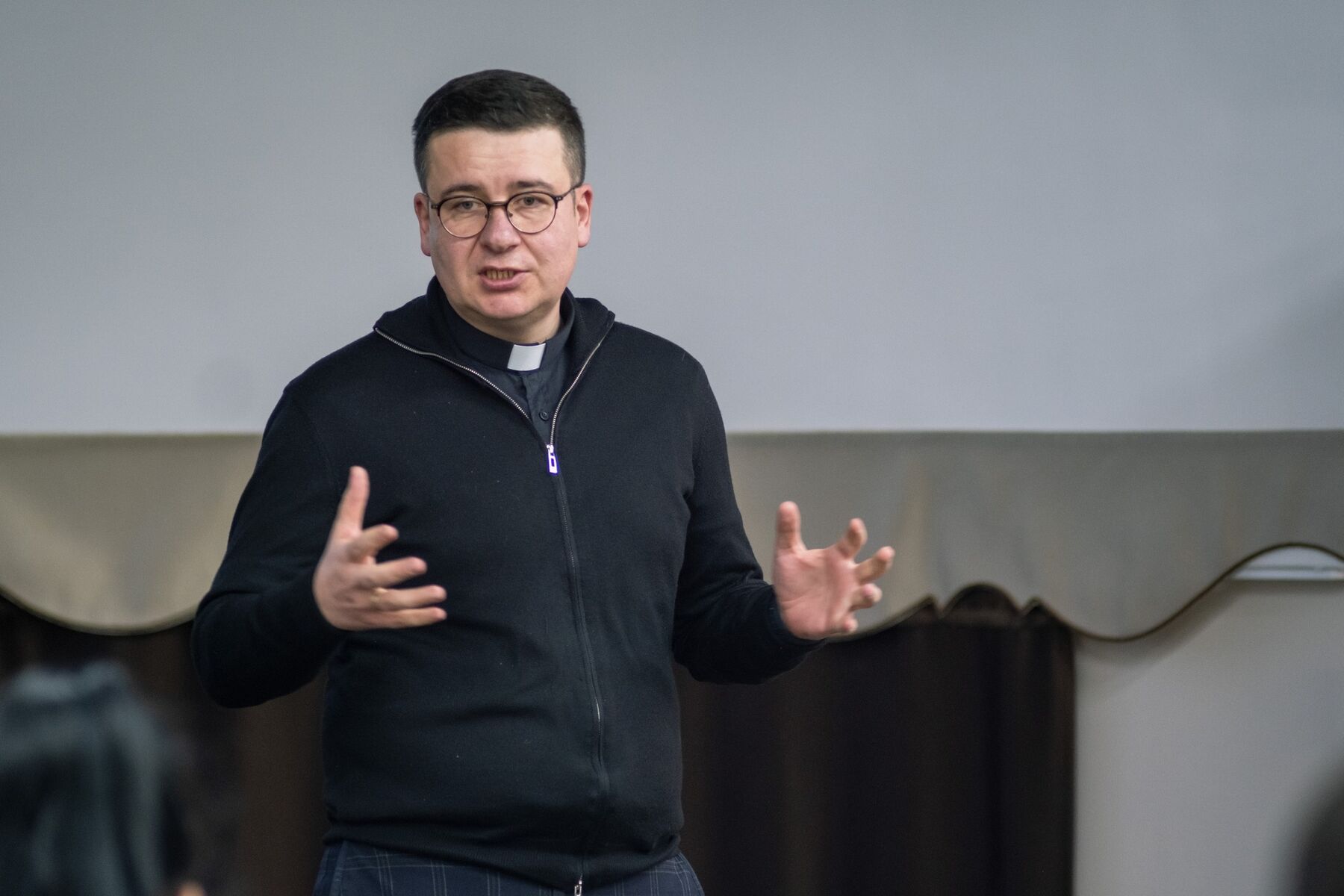
It began to evacuate people from the frontline and dangerous areas, resettling them in a network of shelters and providing food and hygiene kits to those most affected by this war. Thanks to the same foundation, several points of invincibility have also been set up. And today we are already talking about wound-healing centres that are beginning to spread in parishes of the Ukrainian Greek Catholic Church. There are also more strategic projects. This is what we are going to talk about today with Father Lyubomyr Yavorskyy, head of the Patriarchal Foundation Mudra Sprava and Patriarchal Econom of the Ukrainian Greek Catholic Church.
Fr. Ivan Vykhor: During this war, each of us has changed in some way. Perhaps the Patriarchal Foundation Mudra Sprava has also changed. What do you think Mudra Sprava is today?
Fr. Lyubomyr Yavorskyy: War makes its own adjustments, so not everything can be predicted. War is chaos. In this chaos the Church must find its place because we know that the Church brings peace and a certain harmony to the chaos.
Patriarchal Foundation Mudra Sprava, established before the full-scale invasion, had its own goals and objectives. I call them semantic, transformational, that is, those that had to work with communities or social entrepreneurship. Something like the world-famous German organisation Kirche in Not. The Patriarchal Foundation aims to help communities, clergy, and our parishes by supporting their development and projects.
Patriarchal Foundation Mudra Sprava was practically created in February 2022, before the full-scale invasion. We realised the extent of the humanitarian and social crisis that the war had caused for our people and the UGCC. So, we had to respond very quickly to these humanitarian challenges, but also to preserve the structures, because it is through the network that you can serve and help. We are carrying out all these projects because we have managed to transform certain ideas, to look at the organisations we have created in a different way and to involve them. The Patriarchal Pilgrimage Centre started to evacuate internally displaced people, and we started to make food packages with the support of our monasteries, communities, or a Ukrainian producer.
Today, we see that the chaos is slowly receding. But unfortunately, the crisis is not going away. When it comes to responding to humanitarian challenges, we have a great network organisation in our Church — Caritas-Ukraine. That is why the Patriarchal Foundation Mudra Sprava is returning to its original purpose and objectives. And these are big projects, which I call projects on the level of Metropolitan Andrey Sheptytsky. After all, he implemented many projects during the wars, when he was the head of the church. Today we are doing the same projects as the Patriarchal Foundation of His Beatitude Patriarch Sviatoslav, on his behalf. For example, in 2022, when the russians had already withdrawn from Kyiv and there was an opportunity to leave, His Beatitude Sviatoslav and I went to Kryvyi Rih. In Kryvyi Rih, His Beatitude met with representatives of various local communities. He listened to them and asked them what they needed. In return, they told him about their heroic deeds, how they had survived, their dreams, their aspirations and how they wanted to rebuild their homes in the spirit of Metropolitan Andrey Sheptytsky.
In fact, through the Patriarchal Foundation Mudra Sprava, we started working with the community of Zelenodolsk in Dnipro Oblast. We offered a training program to this community. Why? Because they wanted it. There are mined fields around them, a lot of losses and a lot of destruction of towns and villages, so they decided to study. They clearly understand that now there is an opportunity to get grants and funding, and this will allow everyone in the community to develop together. So, we worked out and offered a 5-module training course for 30 people who were pr. They then defended their projects. Now the UGCC’s Counselling Centre helps them to write grants and receive funding. All this is being done for them by the Church. They are surprised. They are wondering that the Church comes to them and organises such a program. We told them about Metropolitan Andrey Sheptytsky, who is focusing on education, on training, on creating cooperatives. It’s a bit of a sine wave, but everything starts with education. That’s why we created this program for them and continue to work with them.
As well as seeing the success of this project, we also saw the wounds of war. As a Church we are called to give hope to people. Hope opens the eyes to the future, to the vision of the future. Hope comes with healing. That is why one of the points of the UGCC strategy until 2030 is to heal the wounds of war. UGCC commissions, including the Patriarchal Foundation Mudra Sprava, established by the Administrative Centre of the Patriarchal Curia of the UGCC, are working on various projects aimed at healing the individual, the community, and the nation.
The Healing Communities project involves representatives of communities from eastern Ukraine who are currently living in the frontline areas. Each community of 30 people takes part in a 5-day module held at the Patriarchal House in Lviv. The project includes communities from the regions of Zaporizhia, Dnipro, Sumy, Kharkiv and Odesa. The project has two aims: to heal and to unite. Often people in a community do not know each other. So, they do not realise this power, which I call “emergent power”, the power in integrity, something that is not inherent in a person, but inherent in integrity. A community if it works together, can rebuild, has power and potential within itself. And that is what we want to convey in this session — resilience, leadership, psychological aspects. And we see a tremendous result!
I’m talking about projects that take the church beyond the temple. There has never been a church in Zelenodolsk. We get to know communities in eastern Ukraine where there are usually no churches. It is the humanitarian projects of Caritas or Mudra Sprava that introduce us to our fellow citizens in the East of our country. Through our projects we go outside our churches and come to them. But then an interesting and I would say asymmetrical moment happened: The Church left the temple, and now they are asking for a church. Today this community in Zelenodolsk says: “We really want our own church, we really want a priest, we have seen the great meaning of this cooperation and the role of the church for us”. We come to these stages of healing, and we look to the future with hope.
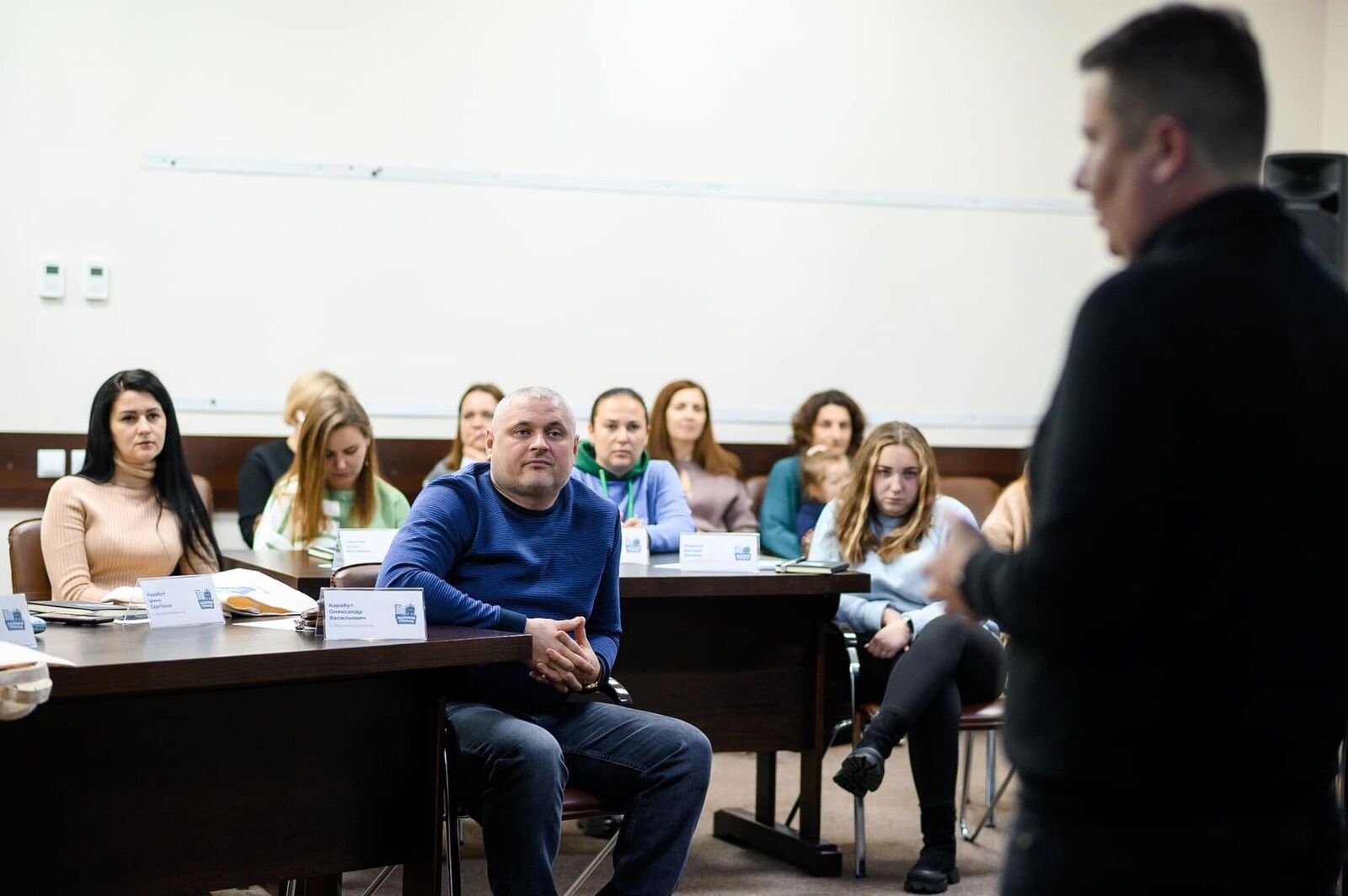
Fr. Ivan Vykhor: First, I would like to ask you about the personality of Metropolitan Andrey Sheptytsky, whom you have mentioned several times. If you look at all the projects implemented by the Patriarchal Foundation Mudra Sprava, you can see a certain historical parallel. It is possible to draw this parallel because Metropolitan Andrey Sheptytsky lived through the First World War, the Second World War, the post-war impoverishment of the Ukrainian people, and therefore many of his ideas were indeed aimed at helping to suffer Ukrainian people, Ukrainian towns, and villages to be restored. And so today we can benefit from his legacy. What are the basic principles that guide the Patriarchal Foundation Mudra Sprava, which were borrowed from the righteous Metropolitan Andrey?
Fr. Lyubomyr Yavorskyy: If you look at the name of the Patriarchal Foundation Mudra Sprava, it has its roots in history. In this definition, we are talking about the Sophistical nature of the cause. This is the wisdom of God and the Sophia of our Ukrainian people. In fact, it is this wisdom that we incorporate when implementing our projects. We definitely make them forward-looking, those that will serve for the long term. In the spirit of Metropolitan Andrey Sheptytsky, we are “rebuilding our own house”. The Foundation’s priority is educational programs. Programmes for the training of clergy are also important. Currently, the UGCC has clergy who are ready for change — to serve where there is the greatest need. Having experienced their own transformation, they are ready to serve the transformational changes of others, to serve in a missionary way.
During every crisis of the Ukrainian people, the Lord sends us His Moses. Metropolitan Andrey Sheptytsky is said to be the Moses of the Ukrainian people. God loves our Church because we had leaders and “Moses” in our Church at every stage. We can also recall Patriarch Josyf Slipyj, his steel, endurance, and vision to preserve the Church in a country where it was underground. Cardinal Myroslav-Ivan Liubachivsky brought the Church back to Ukraine, which came out of the underground. His Beatitude Lyubomyr Husar returned here, to the left bank of the Dnipro, and our Patriarchal Cathedral and the whole complex were built here, where ideas for serving the Ukrainian people were born. Today we have Patriarch Sviatoslav, with whom we walk together and implement all these programmes. Again, because of his vision, his desire to serve and to be there for us.
So, when we really look at this continuity, we are laying down the wisdom of our leadership in different eras, in different periods. As a church, we have the DNA of survival because our church has always endured. Our Church, thank God, has never enjoyed life, but has always been in various trials, persecutions, and challenges. Today’s Head of the Church has faced pandemics, revolutions, war, full-scale war, invasions, annexations, impoverishment of the people, refugees, displaced persons… In fact, we have this DNA, this is our past that has hardened us. Moreover, having this state-building power in us, even today, thanks to our leadership and our dedicated work, we can do wonderful things with one organisation or another to be closer to the suffering Ukrainian people.
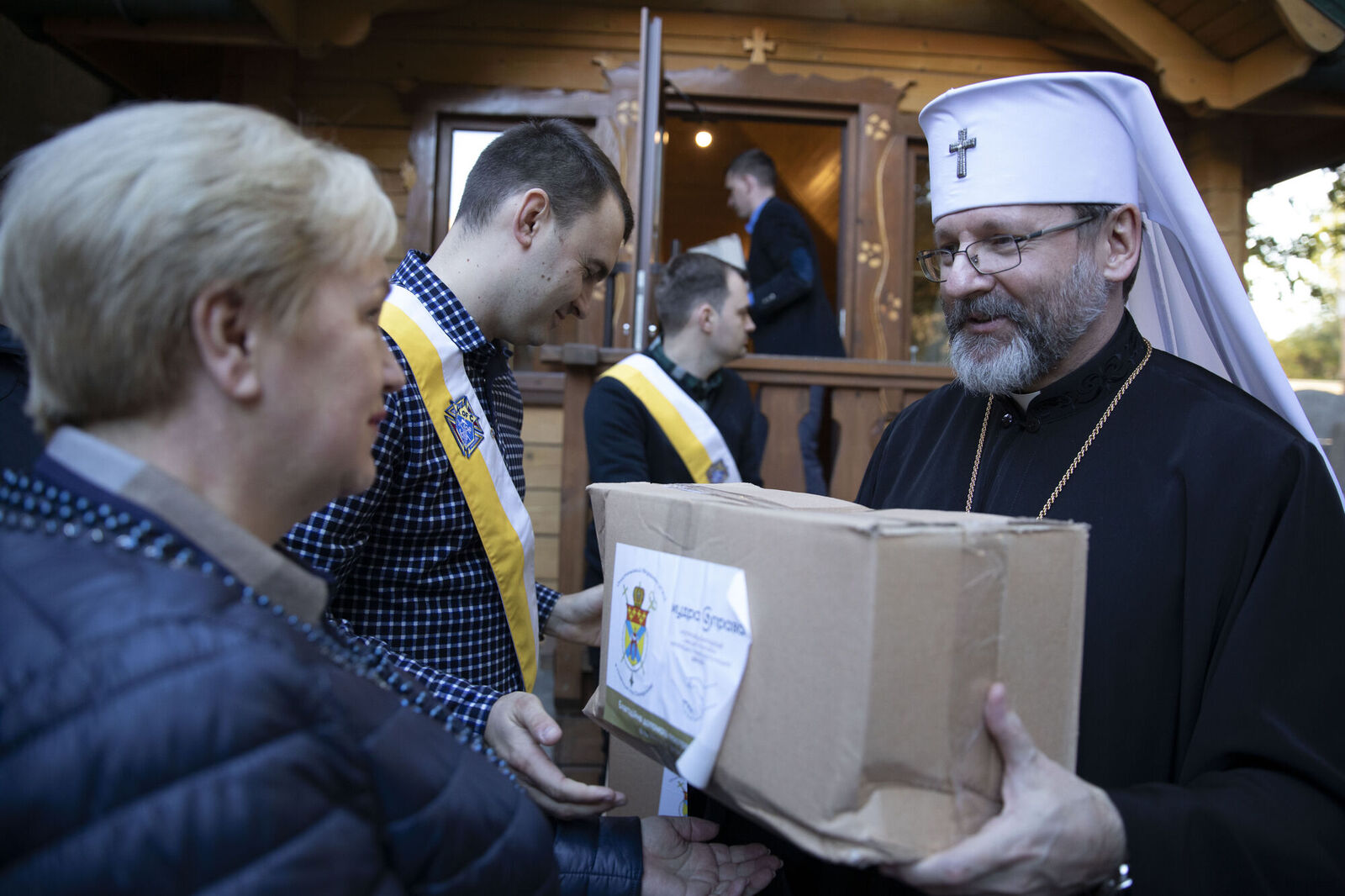
Fr. Ivan Vykhor: Indeed, you mentioned that there is a certain continuity in the activities of the Patriarchal Foundation Mudra Sprava, which is to embody the wisdom of the Church’s leadership. But at the same time, we must also not forget that this leadership of the Church came from the Church itself. Thus, the Church acts synergistically as one body of Christ.
At the same time, you mentioned that to really make certain changes in certain communities, we need good leaders, priests who could coordinate certain processes. How does the Patriarchal Foundation Mudra Sprava engage such priests today, how does it support them, and finally, how does it inspire them to become such good leaders on the local level?
Fr. Lyubomyr Yavorskyy: In my life, this is often repeated. An example is my past service as a military chaplain. We were 176 volunteer military chaplains — priests — who, at the beginning of the war, joined together, did not stay in their parishes, but went to serve, that is, they wanted something more.
Now our attention is obviously directed to the east of Ukraine, where our exarchates are located, where the structures are not yet fully developed, for example, in terms of infrastructure, or the number of clergy, or even material support. Often our clergy in eastern Ukraine live, as His Beatitude Sviatoslav has repeatedly said, below the poverty line. Therefore, they are amazing people. Our task, like their local hierarchs, is to support them.
When you support him, when he sees that the Church is behind him, he is ready to live in that parish. And not only live, but also die for his ministry, for this people. I am surprised, but when we visit them and talk to them, we see that they do not need much, just a little support. That is why our projects were aimed at ensuring that the hands of our priests were not empty, that the hands of our priests always had something to give, whether it was food packages, hygiene kits or some other assistance. And when that priest saw that the Church was behind him, he did everything possible and impossible.
It is a great blessing that we have such dedicated priests. But we need more, and this is a challenge for us. We would really like more priests like this. It may be, that the war will give rise to more vocations. I observe through the projects that we do from the Patriarchal Foundation Mudra Sprava that the demand for our Church is enormously high. It is said, “there is a lot of harvest, but few workers”. And, in fact, there is a lot of harvest. Today, people in the east of our country have had their eyes opened, and they have seen the lies and deception of the Soviet past in which they lived. Now they have a huge demand for authenticity, for truthfulness. And at the same time, they are aware of who wants to take advantage of them and what their intentions are. Again, this is a kind of challenge for us: to go to these people and be close to them.
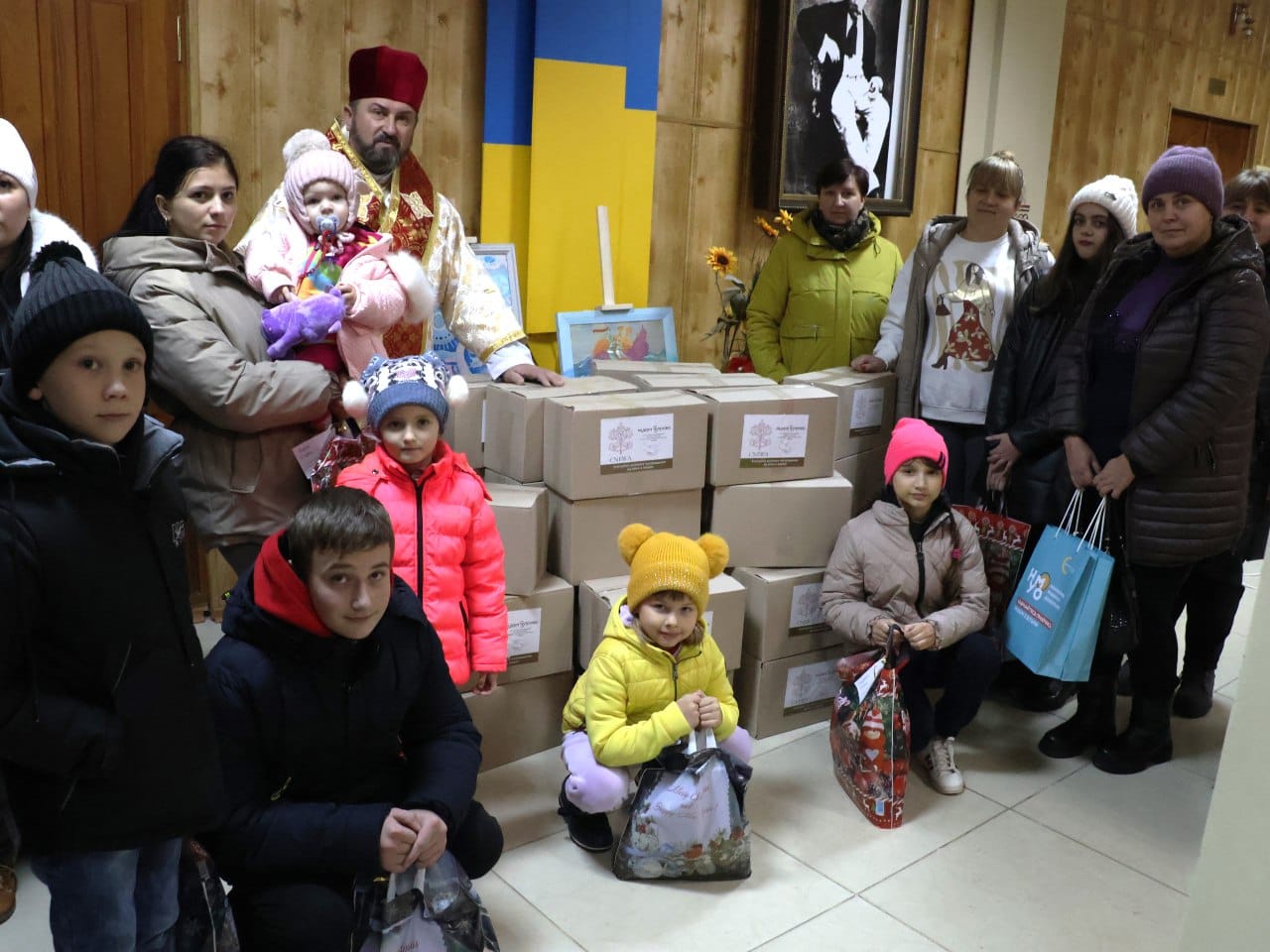
Fr. Ivan Vykhor: In your answer, we can really hear your recent and fresh impressions. Not so long ago, you and the team of the Patriarchal Foundation Mudra Sprava had the opportunity to visit our clergy and our communities in the East of our country. In addition, another Good Samaritan resilience centre has opened in Pokrovsk, 50 km from the front line. What kind of space is this that is called the point of invincibility “Good Samaritan”?
Fr. Lyubomyr Yavorskyy: I don’t want to say that I love it, but I have to and want to come to touch the wounds of war, to look, to see. You can’t serve a person well if you don’t see him/her or communicate with him/her. Like a doctor who makes a diagnosis, he communicates with a person, and only then can he make the right diagnosis. So, in fact, from an office or a church somewhere here in Kyiv, it is difficult to see the needs of the person we visit in the frontline zone. So very often we go there and analyse the success of our projects that are functioning. We also communicate with people, communicate with our clergy, with bishops on the local level.
On our last trip to Zaporizhzhia and Pokrovsk, we visited highly active priests through whom we have been working closely for 2 years during the full-scale invasion. One of our projects was the establishment of the “Good Samaritan” points of invincibility. As of today, we have twenty-five of them across Ukraine. This is quite a lot. However, we understand that we will not be able to cover all the needs. Especially since we picked up this idea when our government launched the project of invincibility points.
The feedback from the beneficiaries of our invincibility points showed their effectiveness and necessity. I received a lot of letters from the heads of district authorities asking us not to close our points of invincibility. There were different periods: there was one need in winter and another in summer. Each invincibility point has its own atmosphere: one has workshops with children, another has a local Caritas, and other focuses on the work of a psychologist.
But it looks like we are closing this project. Today, it has already transformed into the idea of Wound Healing Centres. Still, this is a kind of tent, and therefore it needs to be guarded 24/7. Now we are already putting up more capital structures that perform three main tasks: pastoral, social and psychological. I sincerely hope that we will go to the East and set up and scale up these wound healing centres. Moreover, this is the strategy of our Church — to heal the wounds of war.
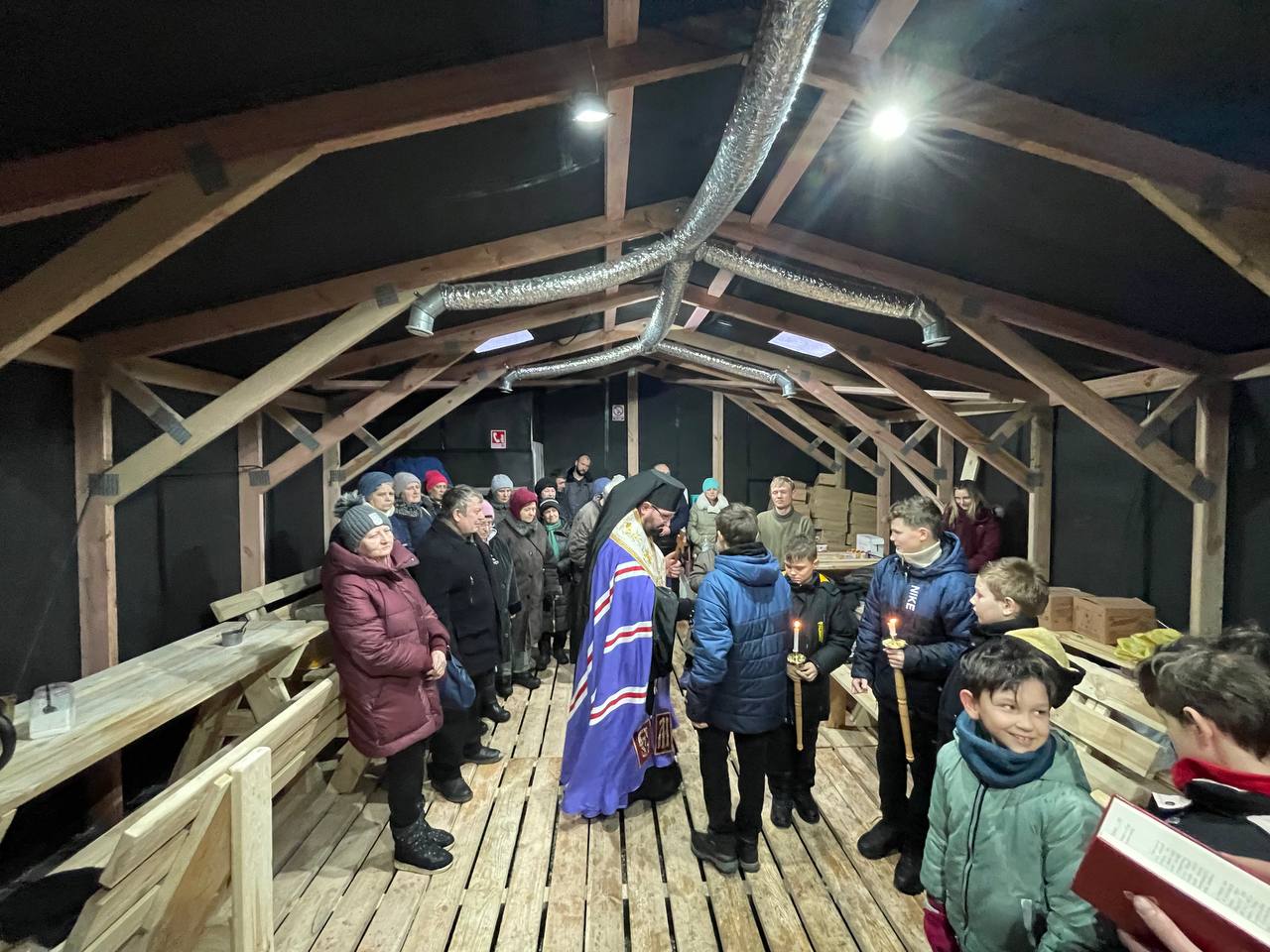
Fr. Ivan Vykhor: Could you tell us in more detail about these Wound Healing Centres? What exactly is going on there? What is it? Is it a room? Is it a certain space? Or are we talking about a certain meeting place?
Fr. Lyubomyr Yavorskyy: Everything you have mentioned is the Wound Healing Center. This is a multifunctional building that does not require large investments, time limits for its equipment, or additional approvals. It is a temporary structure. It is like a modular house, only larger in space. There is a separate room where a clergyman or psychologist can work with different categories of people.
As you know, there are different programmes in our church: work with the families of the victims, work with children, or with other vulnerable categories. We are giving space to the church where it has never been before.
In the East of Ukraine, we often see situations where a priest serves in a trailer. But when he has such a Wound Healing Centre, he expands his boundaries a little bit, and therefore can reach more people. This is a space where a person can come, talk, be heard, and receive help.
Obviously, this idea will also transform and change. War creates different challenges at various stages. We will come back to the post-war period. And this will also be a difficult period. It is said that it is much harder for a soldier returning from the front to go through the adaptation phase than to go to the front. So, this is the post-war period that awaits us. I believe it will happen. My hope and faith say that it will be as soon as possible. I hope and pray for this. In those different time stages, our Centres for Healing the Wounds of War will find their relevance, their time.
The Patriarchal Cathedral has always found its role in any challenge facing Ukrainian society, whether it is during a pandemic, a full-scale invasion, or the Revolution of Dignity. It has always played its unique role in a particular historical period. Having structures in place, we will be able to respond quickly to various challenges related to the war.
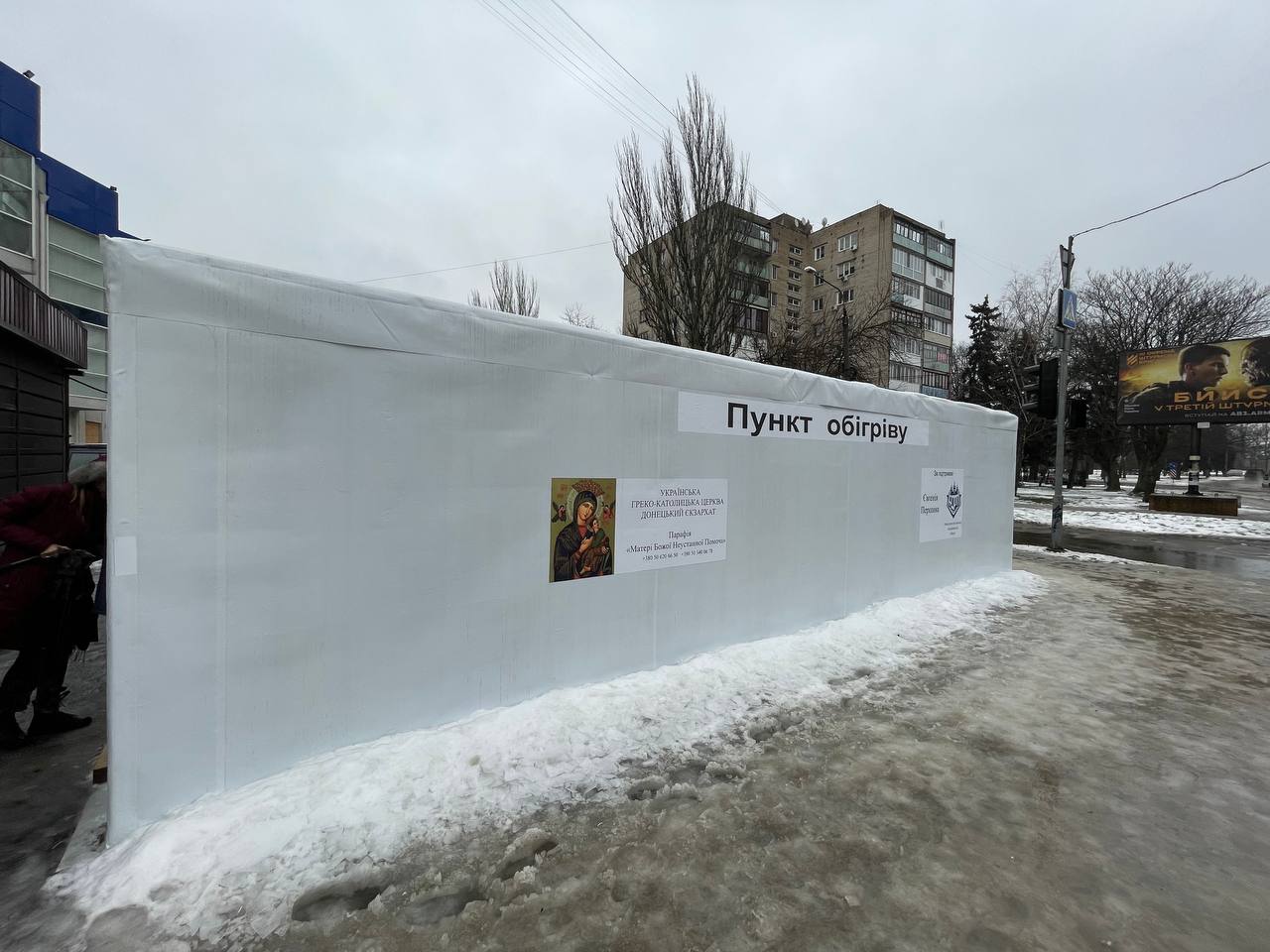
Fr. Ivan Vykhor: Looking at the two-year history of the Patriarchal Foundation Mudra Sprava, we also see the transformation of its format. The initial projects were, in a way, reactionary: they were an immediate response to certain challenges of the war. These included evacuations, resettlement of internally displaced persons, or the provision of food or hygiene kits. This transformation led to the launch of more strategic projects by the Patriarchal Foundation Mudra Sprava, including educational, training, psychological rehabilitation, and spiritual support. You mentioned the projects “Healing Communities” and “Action in Hope” that have already taken place in the Zelenodolsk community. Can we assume that the Patriarchal Foundation is thus preparing a certain ground for this post-war restoration of Ukraine? And how does the Patriarchal Foundation see its function in this post-war reconstruction of Ukraine?
Fr. Lyubomyr Yavorskyy: You have very well noted this transformational moment in the activities of the Patriarchal Foundation Mudra Sprava. The two projects you have just mentioned are extremely relevant and will continue to be so in the postwar period, because we will have the task of rebuilding Ukraine. We will have to rebuild “our own house”. Of course, it will be very difficult for us, but it is very necessary. So now the question of capacity comes to the fore: will we be able to rebuild our home? There are many resources, but are we able to accept and use them? It is important for us to create a magnetic core in the community. A value-oriented structure that attracts value-oriented people through education and programs. We fulfil our role through educational and training initiatives — we provide value guidelines for business, the public sector, and volunteers. We are creating a platform where all these important social role institutions think together: “How are we going to rebuild and what are we doing to rebuild?”
Even today we see how much people need hope. You know, if we wait until the war is over, I’m afraid to say this, but will we live to see it? People are kept alive by hope. Hope must be effective. I remember the director of a Brovary kindergarten who began to actively rebuild her kindergarten after a rocket attack on it. The Exarchate in Germany, headed by Bishop Bohdan Dziurakh, supported her by providing financial support. She said the following key thing: “I educate the children of internally displaced persons, boys, men who are now fighting at the front. They are all doing their job there. I am worried that when they return with victory, they will say: ‘We did our job there, why didn’t you do yours here?’ So, she says: ‘I have to do my job here. When those soldiers know that their children are in good hands and are taken care of, they are more motivated to defend us.’
Everyone, according to their role, should take small steps towards our victory. We, as the Church, have our role, it is defined. We carry it out through pastoral support, through military chaplains, medical chaplains, as a Church in general, through education, humanitarian and charitable assistance, and psychological rehabilitation. This is a united community in the role that the Church can play. So, let’s try to fulfil our role at least with dignity.
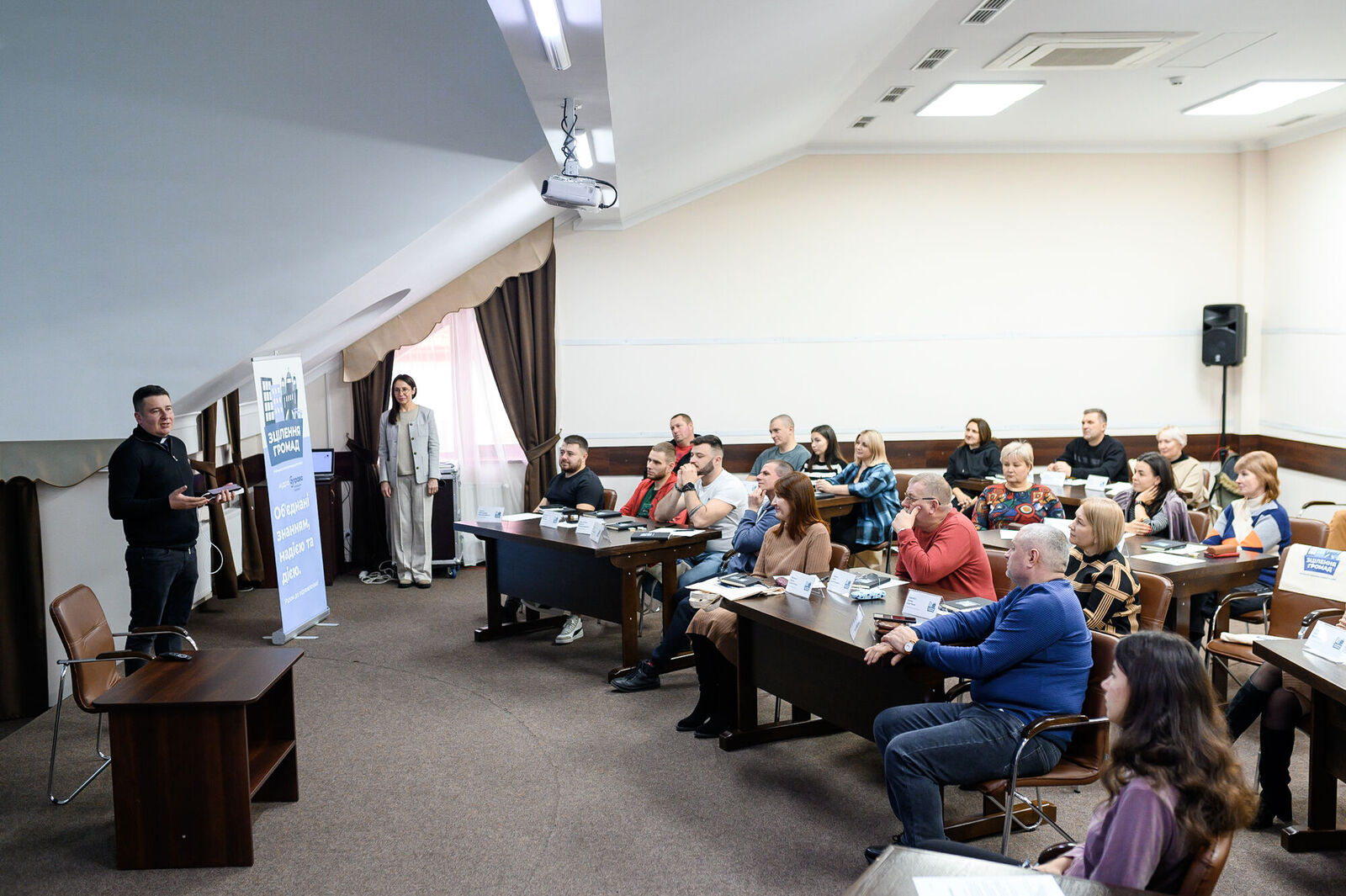
Fr. Ivan Vykhor: You have said very well about the work that everyone should do in their place. The church as an institution, as the body of Christ, also has its own “work”, if we can talk about it in these terms. How does the Patriarchal Foundation Mudra Sprava help the Church to fulfil this “work” — proclaiming the message of the risen Christ?
Fr. Lyubomyr Yavorskyy: Our Synod of Bishops approved the Strategy 2030, which contains 7 important points. It is these points that the Church is strategically implementing today. One of these points is the healing of the wounds of war. They also talk about pastoral conversion, missionary activity, i.e. going out to meet the world, etc. There are 7 good, wonderful guidelines and directions.
Each of the role-playing institutions in our Church that we have created corresponds to a particular mission, direction, and priority. When we speak of the rejected, forgotten, marginalised, Caritas comes to them and provides assistance. When we talk about education, the Ukrainian Catholic University, and the curricula of the commissions of the Patriarchal Curia of the UGCC and the Patriarchal Foundation Mudra Sprava are responsible. When we talk about healing wounds, we have the Health Care Commission, the Department of Military Chaplaincy, and the Penitentiary Department of the UGCC. In other words, we want each of our institutions to be involved in the implementation of the guidelines and directions that our Synod has set out in this strategy.
Another important point to take into account is that we are facing a crisis that has never been seen before. A single role-playing institution will not be able to cope. Therefore, we need to cooperate and exchange information. Therefore, our task as the Administrative Centre of the Patriarchal Curia of the UGCC is to ensure that the organisations we have established strengthen each other by exchanging information. We face a huge challenge, so only in unity and awareness can we better reach the ultimate beneficiary, the one who needs our help the most.
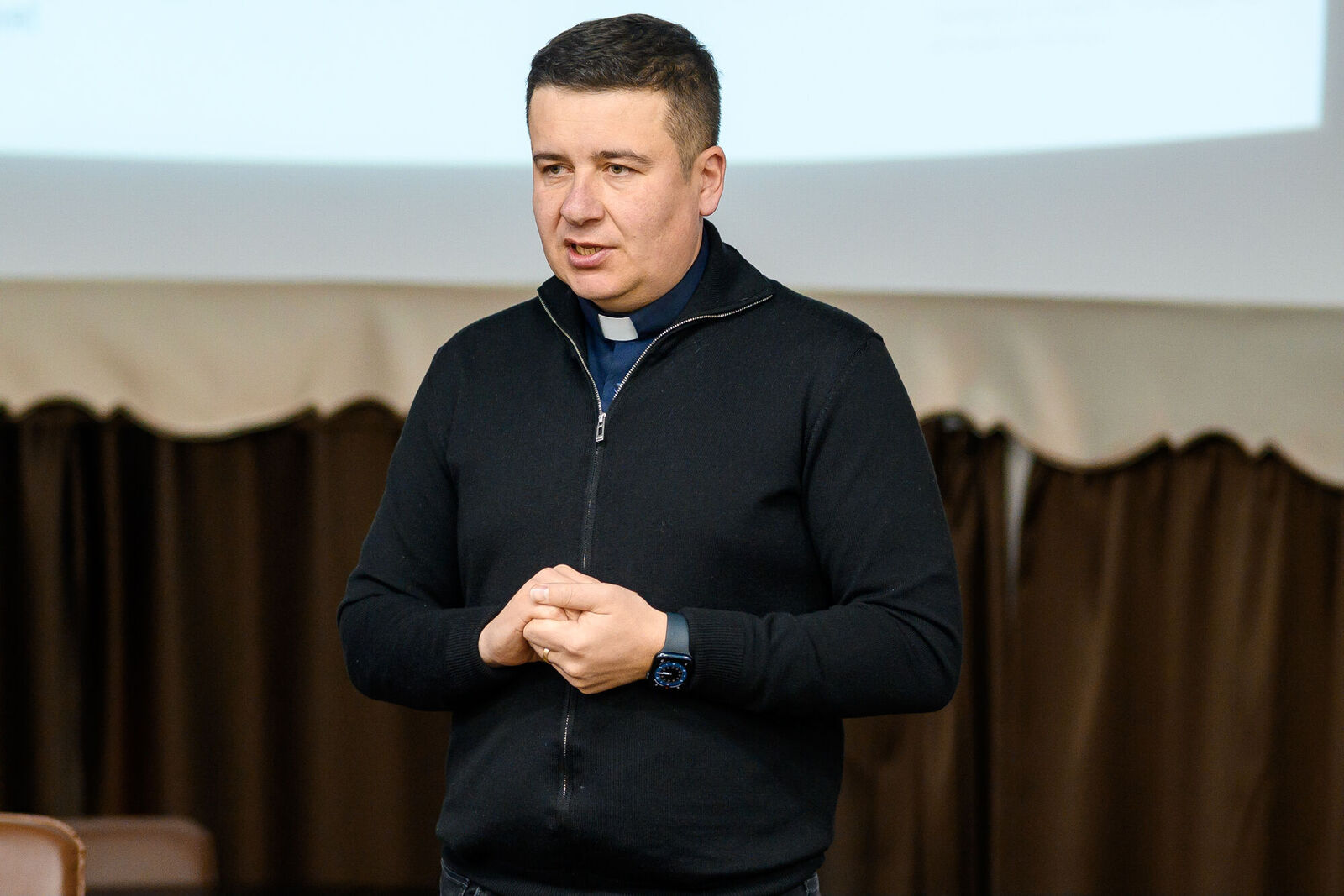
Fr. Ivan Vykhor: In conclusion, please tell us how one can join certain educational initiatives of the Patriarchal Foundation Mudra Sprava, whether we are talking about healing communities or about “Action in Hope”? At the same time, how can one join the activities of Mudra Sprava in general, either through donations, or through their work, or through other service?
Fr. Lyubomyr Yavorskyy: The Foundation was created from the first days of the war, we immediately started projects — humanitarian, charitable, educational. We have never stopped. Obviously, we need to stop, rethink, and look. That is why we are planning strategic sessions to understand where we are heading and what we are prioritising. There are indeed many challenges now, so we need to adjust, analyse, and review all this.
For the Patriarchal Foundation Mudra Sprava, it is currently important to analyse our achievements, and to launch proper or even better communication. Only now we are launching a new website where everyone will be able to see the projects we are implementing, how much resources we have involved, who our donors or partners are, what new projects we are launching, and where we need to raise even more resources. It is important that communities can know in which regions the Patriarchal Foundation Mudra Sprava plans to operate and serve, and then to apply. Therefore, in the coming weeks, the official website of the Patriarchal Foundation Mudra Sprava will be presented.
Today we cooperate with donors and partners with whom we have worked for many years before. We plan to involve Ukrainian donors in our projects in Ukraine. After all, the Patriarchal Foundation still serves most of all thanks to our international partners.
Fr. Ivan Vykhor: Thank you very much for this interview, for sharing your experience, as well as information about the Patriarchal Foundation Mudra Sprava, its projects and activities, which it is trying to implement in the spirit of Metropolitan Andrey Sheptytsky.
Press service of the Patriarchal Foundation Mudra Sprava